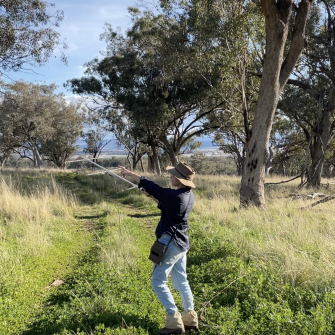Bachelor of Science (Honours)
- Commencing Terms
- Term 1, 2 & 3
- Duration
- 1 Year(s)
- Delivery Mode
- Face-to-face (includes blended)
- Campus
-
Kensington
- Codes
- Program code 4500
- CRICOS code 080283K
-
ATAR/2025 lowest selection rank
- N/A View all admission criteria
-
2026 Indicative first year full fee
- $9,500*
-
2026 Indicative full fee to complete degree
- $9,500*
-
2026 Indicative first year full fee
- $63,000*
-
2026 Indicative full fee to complete degree
- $64,000*

Application closures for 2026
International applications for all undergraduate programs, as well as postgraduate programs offered by the faculties of Arts, Design & Architecture, Engineering (excluding Master of Information Technology and associated programs) and Science are now closed to New Overseas Student Commencement (NOSC) for 2026 intakes.
Postgraduate programs offered by the Business School and the faculties of Law & Justice and Medicine & Health remain open. Master of Information Technology (and associated programs) also remain open.
- Overview
- Entry requirements
- What will I study?
- How to apply
- Fees & Scholarships
Overview
The Bachelor of Science (Honours) degree allows high-performing students to deepen their knowledge of approaches, perspectives and traditions in their chosen scientific discipline and undertake a significant research project.
There are 30 specialisations available covering a wide and diverse range of disciplines, from biology, chemistry and physics to aviation, geology and statistics. As a result of the variety of options that can be chosen across the Faculty, the proportion of research-based work and coursework will differ by School.
In addition to conducting research and coursework, you will generally also be expected to attend and present seminars, write a literature review write a thesis and undertake Occupational Health & Safety (OH&S) training. This degree also provides an academic foundation for you to continue on to a masters by research or a PhD.
Why study at UNSW?
Learn with the best
UNSW Science is at the forefront of many new scientific developments, teaching and innovation. We’re responsive to the needs of industry, adaptive to change and take an innovative approach to teaching and learning. Our world-class laboratories, clinics and simulators give you the tools to explore new frontiers and make meaningful scientific discoveries to benefit society.
UNSW Science is ranked in the global top 50 for nine subjects (QS World University Rankings by Subject, 2025).
- Ranked =#32 globally for psychology
- Ranked #44 globally for natural sciences
- Ranked =#49 globally for chemistry
- Ranked =#37 globally for earth and marine sciences
- Ranked #38 globally for environmental sciences
- Ranked =#28 globally for geology
- Ranked #31 globally for geophysics
- Ranked #48 globally for mathematics
- Ranked #27 globally for materials science
We’re ranked #1 in Australia for research output in physical sciences and #2 in Australia for research output in earth & environmental sciences and chemistry (Nature Index Institution Outputs, 2024).
Leverage our industry connections
Reach your career goals with industry relevant skills and training. Tap into our network of 400+ industry and research partners to start building your own professional connections.
Learn from world-class educators
Study with passionate and pioneering educators, including quantum physicist and 2018 Australian of the Year Professor Michelle Simmons AO, Nobel Laureate Sir Fraser Stoddart, leading marine ecologist and ground-breaking recycling scientist Professor Veena Sahajwalla.
Entry requirements
-
- The 2025 Lowest Selection Rank (LSR) is the adjusted rank (ATAR plus adjustment factors) you would have needed to gain entry to this degree in 2025.
- The 2025 A levels score is based on four Advanced Level (A2) subjects. Entry scores are calculated from the best three or four A2 subjects (excluding repeated subjects) using the following values: A*=6, A=5, B=4, C=3, D=2, E=1. At most one Applied A Level subject may be included in the best four subjects used to calculate the aggregate.
- The 2025 IB Diploma is an indication of the IB you would have needed to gain entry to this degree in 2025. It is to be used as a guide only.
- The 2025 Lowest ATAR is the lowest ATAR (before adjustment factors were applied) to which an offer was made. Where <5 is listed, this indicates that less than 5 ATAR-based offers were made and so the score has not been published. N/A indicates no offers were made on the basis of ATAR.
*The Lowest ATAR to which an offer was made, for this program, is based on a UNSW Gateway Early Conditional Offer.
-
At UNSW, we are committed to ensuring prospective students have all the information they need in order to make informed decisions about their study options.
To assist you in gaining a better understanding of how Admissions works at UNSW, we have provided you with a summary of ATAR offers and the student profile.
We hope this information will help you identify the degree that is right for you.
Students should have completed a three-year full-time undergraduate Bachelor degree and completed a major within the desired honours discipline. Places are competitive, to be considered you will need to have achieved a minimum overall WAM (Weighted average mark) of at least 65%, however for the Applied Mathematics, Quantitative Data Science, Pure Mathematics or Statistics specialisations a minimum of 70% will be required to be considered. In addition to minimum overall WAM requirements, each School may have additional criteria, that needs to be met in order to be considered.
For more details about the application process, or to contact our program coordinators for the specialisation you’re interested in, please visit the Science Honours: How to apply
Note: This Honours program is the pathway from the following UNSW Science programs: 3980 Bachelor of Aviation (Flying), 3981 Bachelor of Aviation (Management), 3970 Bachelor of Science, 3965 Bachelor of Science (Environmental Management), 3959 Data Science and Decisions (Quantitative Data Science major), 3991 Bachelor of Medical Science and their associated dual degrees.
Assumed knowledge
N/A
Adjustment Factors
We offer a range of adjustment factor schemes that reward students for academic performance and extra-curricular achievements. These schemes also take into account a range of personal and educational disadvantages that may have affected your studies.
HSC Plus
This scheme rewards students who perform well in Year 12 subjects that are relevant to their preferred UNSW degree. You may be awarded up to five points.
Elite Athletes, Performers and Leaders (EAPL)
This program recognises achievements in the areas of sport, academia, leadership and music at an elite level. You may be eligible for up to five points.
Educational Access Scheme (EAS)
Factors such as illness, financial hardship, language difficulties or attending a particular school can mean you don't always get the best possible marks in Years 11 and 12. If one of these situations applies to you, submit an application for the Educational Access Scheme (EAS) via UAC. Eligible students can receive between 1 and 10 points towards their chosen UNSW degree.
Admission pathways
Your ATAR is not the only measure of your potential to succeed, which is why we offer a range of pathways into university. Explore your options below and get in touch with our Future Student Advisers to discuss your path to UNSW.
Gateway Admission Pathway
This scheme is open to students who attend Gateway schools, live in a low-socioeconomic area based on IEO index of SEIFA criteria, are Aboriginal and/or Torres Strait Islander, or hold an eligible humanitarian or protection visa. This pathway provides early offers and early conditional offers with a reduced ATAR entry requirement for your preferred UNSW degree.
Entry programs for Australian Aboriginal and Torres Strait Islander people
We offer entry programs for Indigenous Australians, including the Indigenous Preparatory Programs and the Indigenous Admission Scheme (IAS). The entry pathway program you apply for will depend on the degree you want to study.
English language requirements
You may be asked to provide evidence of your English proficiency to study at UNSW depending on your educational background and citizenship. English language skills are vitally important for coping with lectures, tutorials, assignments and examinations - this is why UNSW requires a minimum English language competency for enrolment.
If you’re completing an Australian Year 12 qualification (e.g. NSW HSC or equivalent), you do not need to provide anything extra to prove your proficiency. Your qualification will be used as evidence of your English proficiency.
If you do need to provide evidence of your English proficiency, this will be indicated in your application. You can prove this by providing evidence that you meet one or more of the following criteria:
- English language tests and university English courses
- Prior study in the medium of English
- Other qualifications
If you need to improve your English skills before you start your degree, UNSW College’s Academic English Programs are for you. The programs are suitable for various English levels and help you prepare for university studies and life in Australia.
For more details, visit the English Language Requirements page.
Admission pathways
If you do not meet the requirements for direct entry into your chosen degree, you may be eligible for a pathway program with UNSW College. UNSW College provides alternative entry options using university-approved content so that you can start your UNSW journey with confidence.
Entry requirements
English language requirements
You may be asked to provide evidence of your English proficiency to study at UNSW depending on whether you are from an English-speaking background or non-English speaking background. English language skills are vitally important for coping with lectures, tutorials, assignments and examinations - this is why UNSW requires a minimum English language competency for enrolment.
If English is not your first language, you’ll need to provide proof of your English proficiency before you can be given an offer to study at UNSW. You can do this by providing evidence that you meet one or more of the following criteria:
- English language tests and university English courses
- Prior study in the medium of English
- Other qualifications
If you need to improve your English skills before you start your degree, UNSW College’s Academic English Programs are for you. The programs are suitable for various English levels and help you prepare for university studies and life in Australia.
For more details, visit the English Language Requirements page.
Check the specific English language requirements for this program
What will I study?
UNSW is introducing a new academic calendar from 2028.
We are moving to a new flex-semester calendar. What does this mean for your studies?
Program structure
Deepen your knowledge of approaches, perspectives and traditions in your chosen scientific discipline and undertake a significant research project over a year.
In addition to conducting research and coursework, you'll also be expected to undertake Occupational Health & Safety (OH&S) training, attend and present seminars, write a literature review, and write a thesis.
You'll get to immerse yourself in study in one of the following disciplines:
- Anatomy
- Applied Mathematics
- Aviation
- Bioinformatics
- Biology
- Biophysics
- Biotechnology
- Chemistry
- Climate Science
- Ecology
- Environmental Management
- Exercise Physiology
- Genetics
- Geography
- Geology
- Marine Science
- Materials Science
- Medical Science
- Microbiology
- Molecular and Cell Biology
- Neuroscience
- Palaeoscience
- Pathology
- Pharmacology
- Physical Oceanography
- Physics
- Physiology
- Pure Mathematics
- Quantitative Data Science
- Statistics
- Vision Science
How to apply
There are 30 specialisations available across a wide and diverse range of disciplines. Each specialisation has its own l application and entry requirements. It's imperative that you understand the terms specific to your specialisation of choice before applying. If you wish to apply for more than one honours area in UNSW Science, you must complete separate applications for each nominated area.
For the detailed application process, or to contact our program coordinators for the specialisation you’re interested in, please visit Science Honours: How to apply
There are 30 specialisations available across a wide and diverse range of disciplines. Each specialisation has its own l application and entry requirements. It's imperative that you understand the terms specific to your specialisation of choice before applying. If you wish to apply for more than one honours area in UNSW Science, you must complete separate applications for each nominated area.
For the detailed application process, or to contact our program coordinators for the specialisation you’re interested in, please visit Science Honours: How to apply
Fees & Scholarships
Commonwealth Supported Place: Student Contribution Band 2
*The student contribution for a Commonwealth Supported Place is an indication only of the amount payable in Year 1 based on a standard full-time load of 48 credit points (1.0 EFTSL). The actual student contribution you will be liable for depends on your individual program of study and the calendar year in which you enrol. Actual fees are calculated upon enrolment. Student contribution amounts are subject to annual review by the university and may increase each year during your studies (subject to caps determined by the Australian Government), effective at the start of each calendar year.
The indicative fees listed here are based on an estimated average and are for tuition only - other fees and charges are not included.
*Fees are subject to annual review by the University and may increase annually, with the new fees effective from the start of each calendar year. The indicative fees listed here are based on an estimated average and are for tuition only, other fees and charges are not included. The amount you pay will vary depending on the calendar year to enrol, the courses you select and whether your study load is more or less than 1 Equivalent Full Time Student Load (8 courses per year).
Indicative fees are a guide for comparison only based on current conditions and available data. You should not rely on indicative fees. More information on fees can be found at the UNSW fees website.
Indicative fees to complete the program have been calculated based on a percentage increase for every year of the program. Fee increases are assessed annually and may exceed the indicative figures listed here.
Indicative fees to complete the program include tuition plus an estimate of study-related costs of approximately $1,000 per year. To find out more about other costs, visit UNSW International.
Scholarships
At UNSW, we award over $83 million in scholarships each year. We pride ourselves on rewarding excellence and making university accessible to students from all walks of life. Whether you’re a domestic or international student, our range of scholarships, prizes and awards can support your journey.
Progress starts here – at a world-leading university

Top 20 Worldwide
UNSW is ranked #20 university in the world
QS World University Rankings, 2024–2026

Most Employable Graduates
Winner of the AFR Most Employable University Award seven years in a row
AFR Top100 Future Leaders Awards, 2020–2026

Australia's #1 for Innovation
Highest number of startups and spinouts from university-developed tech
SCOPR report, 2024






